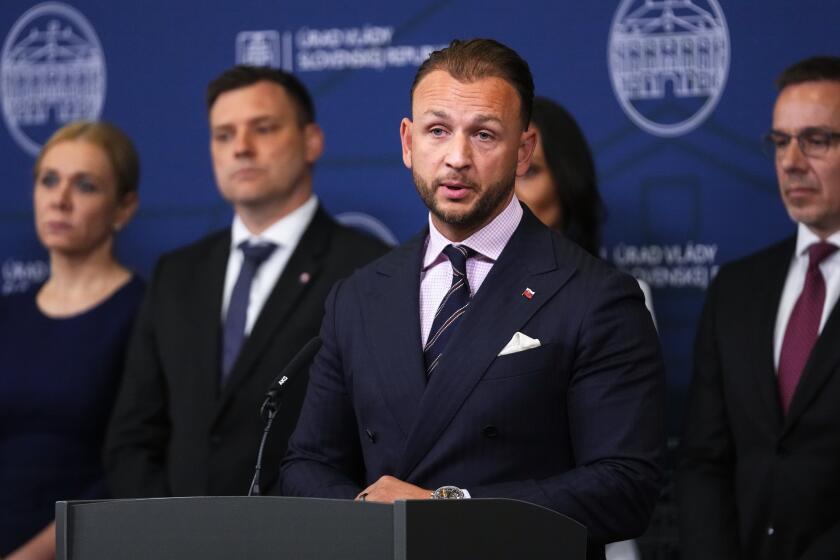A nuclear deal, warts and all
THE WHITE HOUSE will soon start lobbying Congress to approve its recent nuclear deal with India. Even before President Bush returned home, his foreign policy team was touting the economic payoffs from access to the Indian market, India’s democratic credentials and the common interest India and the United States have in checking China’s influence.
The problem is that key members of Congress and the vocal nonproliferation pundits don’t buy these arguments. They’re already gearing up for a fight, claiming that the administration has effectively killed the Nuclear Nonproliferation Treaty. (Never mind that this pact has been a dead letter in South Asia and that neither India nor Pakistan ever signed it.) This deal has been signed, but it’s far from done. Under the best of circumstances, India will have a long wait before it receives any American nuclear technology or fuel.
In the meantime, it’s worth examining the critics’ case.
Their biggest complaint is that India is being rewarded for having developed nuclear weapons. The reality is that India will build even more nuclear weapons, plus better means to deliver them, no matter what the U.S. does. And the other nuclear powers -- China aside -- will eventually sell it nuclear fuel and technology because there’s money to be made. That’s why Jacques Chirac turned up in New Delhi just before Bush.
A related criticism is that the agreement with India will give would-be nuclear states a green light. The logic underlying this scary, and initially plausible, scenario is faulty. Consider Iran and North Korea. Their nuclear programs began well before the India deal was conceived.
None of this means that the agreement is flawless.
For openers, Pakistan, which has been told that it won’t get what India just did, will be bitter. President Pervez Musharraf has stuck his neck out to help the U.S. campaign against Al Qaeda and the Taliban -- he has survived two assassination attempts. He may smile gamely in public, but he’s not happy about the preferential treatment that his nemesis has just received from Bush, who keeps referring to Pakistan as a critical ally in the war against terrorism. And to add insult to injury, American supporters of the deal claim that the lack of symmetry is justified because India is two things that Pakistan is not: democratic and stable.
This explanation won’t go down well with Pakistanis, many of whom already loathe the U.S. Notice that Air Force One touched down in Islamabad in the dead of night with its landing lights off, and that Islamabad was virtually locked down during Bush’s visit.
Defenders of the deal emphasize the commercial and strategic benefits it will bring. The potential gains do seem impressive. India has one of the world’s fastest growing economies, and although a large proportion of its 1 billion people is poor, its middle class is as large as the combined populations of Britain, France, Germany, Italy and Spain. Imagine millions of Indians with iPods and PCs and you can understand why many American companies are excited. U.S. strategists also see India as a natural ally against China. What’s not persuasive is the suggestion that these future gains required the recent nuclear accord. Presumably, India and the U.S. have independent reasons to cooperate.
For some Americans, India’s large market offers opportunities. To others, its exports and its emergence as a prime venue for outsourcing threaten job security -- and those call centers in India are the leading edge of a larger problem. The true test of the relative strengths of the optimists and the pessimists will occur if the U.S. experiences an economic downturn. There’s an even chance that the newfound economic relationship with India could then come under attack.
There also could be problems on the strategic front, and Iran is likely to be the first. After a heated internal debate, India did eventually support the International Atomic Energy Agency decision to “refer” Iran to the U.N. Security Council. That doesn’t mean it will routinely back American efforts to isolate Iran. Yet India had best be ready, because Washington will come calling for such support -- and soon.
American hawks are agog about the threat China presents to India and the U.S. The reality is that China poses no danger that India cannot now deal with independently, nor is it clear how alienating Beijing by joining a U.S.-sponsored scheme of containment will add to India’s security. And the claim that America needs India’s help to offset China is just silly given the gargantuan gap favoring the U.S. in all reasonable measures of power, save population.
The bottom line? The nuclear deal won’t have the dire consequences the nonproliferation priesthood prophesies, and boosters of the new “strategic partnership” are hyping its benefits while sugarcoating its problems.
More to Read
Start your day right
Sign up for Essential California for news, features and recommendations from the L.A. Times and beyond in your inbox six days a week.
You may occasionally receive promotional content from the Los Angeles Times.






